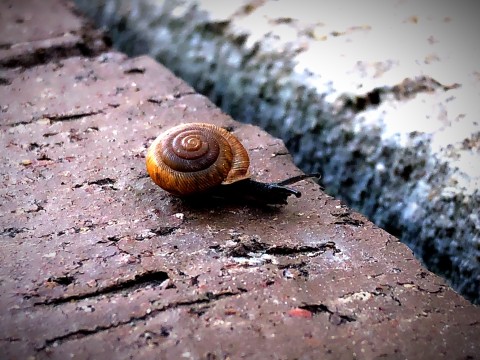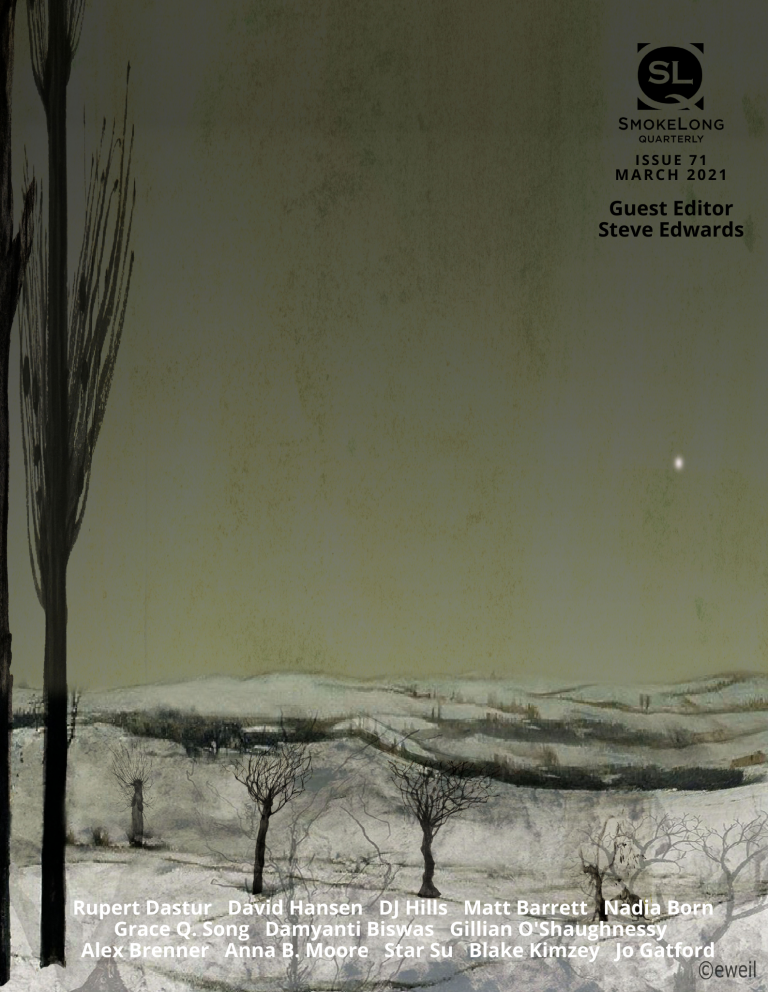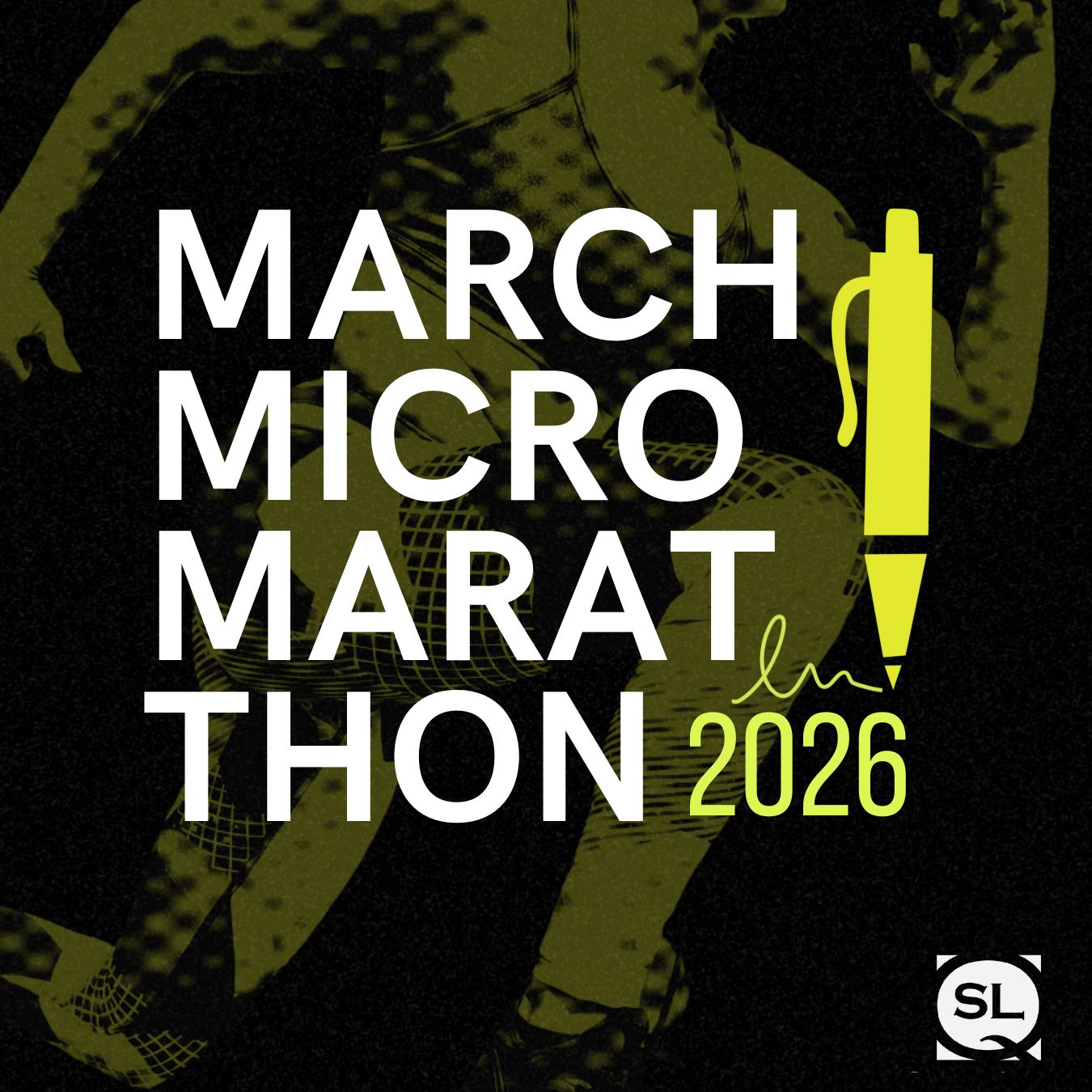When I first told you I was sick, what you heard was that I could live this way. Everything was different in the beginning. The doctors used words like “remission” and “cure.” They said such a thing was possible. Back then anything was possible. You thanked God for some reason, as if you believed in that sort of thing. Years passed this way between us, you hoping, and me never daring to admit I didn’t. I had my doubts. It was easier for you to buy in from across the room. You held my purse while they touched me, took blood, ran tests. It was happening to me, not you. Back then I kept from you how hard I struggled to swallow even water sometimes. My throat doesn’t work, the throat you made, and of course that’s not all, but we didn’t know that yet.
This was all before my heart gave out, that night you found me face down in the gravel driveway. You watched my body collapse from our kitchen window. I remember hitting the ground. Just days before my birthday. I made jokes in the ambulance. She’s normally much funnier, you said. I could tell they were afraid to laugh, to speak, to move. We drove so fast. Code blue, they yelled as we moved down a sterile white hallway. You tried to run after us, impossible with your arthritis. I saw you standing in the ambulance bay. Finally, you were crying.
I arrived late into the world because you didn’t really want kids. I know you blame yourself, as if somehow this is your punishment for delayed maternal sentiment. Disability is such a funny thing, in that it can separate from the body and begin again in others. To many, I become a cautionary tale. At the severity of my illness, I see many wondering what grave sins I, or perhaps you, have committed, as if anything in life was ever that fair. But to allay the wonderers: there was plenty of petty theft and even some vandalism. I’ve run away from the police a dozen or so times. I was pretty good at hopping fences; becoming an attorney was such an extraordinary waste of my talent. I left my husband on his birthday. Cruel, but he deserved it. I curse occasionally, usually at people who deserve far better. I lost my late grandmother’s earrings on a drunken tear. Surely there’s more I’ve forgotten.
You love telling the doctors that as a child, I sat outside during the rainy season and carefully moved every snail from our walkway to safer ground. Thousands spared a cruel death under foot. I feel embarrassed watching you negotiate with them, as if my outcome could be any different. How many snails to spare my life? How many must be saved? It was several years before the doctors realized their initial diagnosis was wrong. Now they have assigned my illness a new name, harder to spell, with too many consonants. Only one in every million people, they said, exceptionally rare. An orphan disease, they call it, with stunningly high fatality rates. Now they use phrases like “palliative care,” and “end of life plan.” They bring medical students to see me, a once in a lifetime opportunity, or so they say. Beside my cot I can see you thinking, But what about her snails? How can all her kindness add up to nothing, you ask, trying to make the math work in your head. Only I can hear the break in your voice. They’re all so busy touching me. They don’t care about our snails.
The arithmetic of my disease is meaningless because we both know what is coming. Barring a sudden accident, you’ll need someone else to settle your affairs and I’m sorry for that. Every plan you ever had is being re-written, but it’s not just you. I cry so hard when I hold my cat sometimes that he struggles to escape my grip. He can’t understand that we’re standing on a ledge, looking over, and every moment together feels like our last. But you understand. I make you promise not to give him away after I go, not to put him down just because he reminds you of me. You agree, but I can’t tell if you’re lying. I leave you five pages of instructions anyway. He needs an inhaler twice a day. He doesn’t like to eat alone. You have to sit next to him, rub his back. I know he’s annoying, I say, just tell me you understand. You nod, but your eyes are so cloudy that I can’t tell if you’re even looking at me. I then remember how badly you need cataract surgery. You put it off because you assumed I would be able to drive you if we waited just a little bit, until the remission and the possibilities arrived. Who’s left now? So little family, all are too far and too old. You made a point of never making friends.
I know very little about sentiment, but when my moment comes, what matters most is that you tell me again about our snails. I won’t feel embarrassed for you this time. Look me in the eye when you do it, or try. I want to see whatever’s left of your smile. I’ll hold your hand until you have to take your own. You’ll tell me I was a good kid, and I guess I was good enough, but it would end this way even if I hadn’t been. I know I don’t have to be sorry, but I am. They’ll drug me up so good that I won’t know who’s coming or going, but I promise to laugh until it’s the last sound we hear. So I ask, if that’s your final memory of me, my laughing about my snails until the EKG wires peel from my chest, would that really be so bad?



 In its third year, The March Micro Marathon will be, as usual, a prompt-a-day whirlwind for 24 days. You’ll exchange drafts of micro fiction, non-fiction, and prose poetry in small groups and gather for a series of online events (all recorded for participants unable to attend live). We’ll finish with 3 competitions, and participants who are not already in SmokeLong Fitness will be invited to workshop with SmokeLong Fitness until the end of April!
In its third year, The March Micro Marathon will be, as usual, a prompt-a-day whirlwind for 24 days. You’ll exchange drafts of micro fiction, non-fiction, and prose poetry in small groups and gather for a series of online events (all recorded for participants unable to attend live). We’ll finish with 3 competitions, and participants who are not already in SmokeLong Fitness will be invited to workshop with SmokeLong Fitness until the end of April!